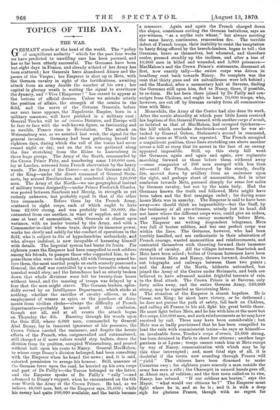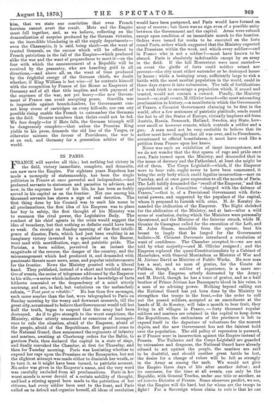TOPICS OF TT - TE DAY.
THE WAR. GERMANY stands at the head of the world. The "policy of magnificent audacity" which for the past four weeks we have predicted to unwilling ears has been pursued, and has so far been utterly successful. The Germans have been but eight days in France, and already a third of her Army has been scattered ; her Generals have abandoned Alsace and the passes of the Vosges ; her Emperor is shut up in Metz, with the German cavalry in sight of the fortifications, awaiting attack from an army double the number of his own ; her capital in gloomy wrath is waiting the signal to overthrow the dynasty, and "Vive l'Empereur ! "has ceased to appear at the bottom of official decrees. Unless we mistake utterly the position of affairs, the strength of the armies in the field, and the nerve of the German Generals, before our next issue appears, the Napoleonic Empire, born in a military massacre, will have perished in a military rout ; General Trochu will be ad interim Dictator, and Europe will be face to face with the well-known figure, so fascinating and
so terrible, France risen in Revolution. The attack on Weissemburg was, as we asserted last week, the signal for the general invasion. Germany had been gathering herself for eighteen days, during which the roll of the trains had never ceased night or day, and on the 4th was gathered along the line stretching from the Rhine to Luxemburg in three huge groups. The Army of the South, commanded by the Crown Prince Fritz, and numbering some 140,000 men, lay at Landau, screened from French observation by the heavy woods. The Army of the Centre—or, as the Germans call it, of the King—under the direct command of General Stein- metz, lay around Zweibriicken, and numbered about 120,000 men. The Army of the North—we use geographical instead of military terms designedly—under Prince Frederick Charles, was posted between Saarlouis and Merzig, in strength as yet entirely unknown, but probably equal to that of the other two commands. Before them lay the French Army, scattered in eight corps, each of which ought to have been 42,000 strong, and was probably but 30,000, dis- connected from one another, in want of supplies, and in one case at least of ammunition, with Generals at almost open variance, with no leader trusted by the Army, and with a Commander-in-chief whose brain, despite its immense power, works too slowly and subtly for the conduct of operations in the field, who is subject to fits of hypochondriac melancholy, and who, always indolent, is now incapable of harassing himself with details. The Imperial system had borne its fruits. For eighteen years the Emperor had been compelled to seek soldiers among his friends, to pamper those who supported him, to de- press those who were independent, till with Germany armed be- fore them, the most martial people on earth scarcely possessed a General, the staff was controlled by a mere favourite whom no marshal would obey, and the Intendance had so utterly broken down that whole divisions were left for twenty-four hours without bread, and the massing of troops was delayed by a fear that the men might starve. The German leaders, splen- didly served by an Intelligence Department, which sticks at nothing, whether the sacrifice of cavalry officers, or the employment of women as spies, or the purchase of docu- ments from civilian clerks—always the difficulty of French departments—probably knew much of this confusion, though not all, and at all events the attack began on Thursday the 4th. Bursting through his woods upon the Geis Hill, where 8,000 men, commanded by General Abel Douay, lay in innocent ignorance of his presence, the Crown Prince carried the eminence, and despite the heroic efforts of the French, who, outgeneralled and outnumbered, still charged as if mere valour would stop bullets, drove the division from its position, occupied Weissemburg, and poured without halt upon his route to Nancy. General MacMahon, to whose corps Douay's division belonged, had been consulting with the Emperor when he heard the news ; and, it is said, extorted permission to avenge his honour. Still, unaware of the German force upon the road, he hurried up his own corps and part of De Failly's—the Turcos belonged to the latter, and the Emperor speaks of De Failly's "rally "—and advanced to Douay's support, when he encountered on the 6th near Worth the Army of the Crown Prince. He had, as we believe, 40,000 men, but, as the Emperor says, 33,000; while his enemy had quite 100,000 available, and the battle became a massacre. Again and again the French charged down the slopes, sometimes cutting the German battalions, says an eye-witness, "as a scythe cuts wheat," but always meeting the same heavy, continuous, remorseless fire. The terrible defect of French troops, their inability to resist the temptation to hasty firing offered by the breech-loaders, began to tell ; the Germans, brave as themselves, but educated, and therefore cooler, pressed steadily up the inclines, and after a loss of 10,000 men in killed and wounded, and 5,000 prisoners- MacMahon's and the Crown Prince's statements, dissonant at first, now exactly tally—the entire corps was driven in headlong rout back towards Nancy. So complete was the rout that thirty guns and six mitrailleuses were left behind ; and the Marshal, after a momentary halt at Saverne, finding the Germans still upon him, fled to Nancy, there, if possible, to re-form. He has been there joined by De Failly and con- scripts from CLUons, and ought to have 70,000 troops, who, however, are cut off by German cavalry from all communica- tion with Metz.
Meanwhile, the Army of the Centre had also done its work. After the scenic absurdity at which poor little Louie received his baptism of fire, General Frossard, with another corps d'armete, as isolated as that of MacMahon, had occupied Spicheren- the hill which overlooks Saarbrack—and here he was at- tacked by General Goben, Steinmetz's second in command,. and the scene at WOrth was repeated. The French occupied. a magnificent position, three lines stretching one above another- across a hill so steep that its ascent in the face of an enemy appeared impossible. Still, up this steep hill went the Germans, again and again and again, new regiments. marching forward as those before them withered away —some companies of 200 men emerged with less than. 40—until the French, destroyed by the steady, deadly fire, mowed down by artillery from an eminence upon the right, and perhaps short of ammunition, fled in utter confusion towards Metz, pursued sharply for some few miles by German cavalry, but not by the main body. Had the Germans known the truth and followed, Metz might have been taken and the first campaign ended ; for during some hours Metz was in anarchy. The Emperor is said to have been, away—we should think an impossibility—but the Staff, by the testimony of all eye-witnesses, utterly lost its head, did not know where the different corps were, could give no orders, and expected to see the enemy momently before Metz. The Emperor sat writing despondent telegrams, Mett. was full of beaten soldiers, and but one perfect corps was within the lines. The Germans, however, who had been terribly handled, and are enthusiastic in their admiration of French courage, wanted ammunition and reinforcements, and contented themselves with throwing forward their immense strength of cavalry. All the villages between Sa.arbruck and Metz have been seized ; bodies of German horsemen have been met between Metz and Nancy, thrown forward, doubtless, to cut telegraphs and railways between those two points ; and the Army of the North, hitherto untouched, has joined the Army of the Centre under Steinmetz, and both are- believed to have advanced amidst frightful torrents of rain, to the final attack. The Crown Prince is at Saverne, only forty miles away, and the entire German Army, 350,000 strong, may be regarded as threatening Metz.
The situation of the Emperor is almost hopeless. He is Omar, not King ; he Must have victory, or be dethroned ; he dare not pursue the path of safety, fall back on Chalons, and calling all France to his aid, fight his great battle there.. He must fight before Metz, and he has with him at the most but five corps,150,000 men, and such reinforcements as he may have received by rail. These may have been considerable ; but. Metz was so badly provisioned that he has been compelled to load the rails with commissariat trains—he says so himself— an invaluable force, Trochu's corps d'arme'e, 35,000 strong,. has been detained in Paris to shoot her citizens ; another large garrison is at Lyons ; troops cannot reach him at Metz except. by way of Nancy, communication with which may be by this time interrupted ; and, most fatal sign of all, it is doubtfsl if the tocsin now sounding through France will "yield." The citizens have been disarmed to make Cassarism easy ; for eighteen years scarcely a man outside the army has seen a rifle ; the Chassepot in unused hands goes off, as About says, of volition; and the first town called on to rise, Nancy, has refused. "If our soldiers are beaten," says the Mayor, "what would our citizens be I" The Emperor must fight where he is, and as he is ; and it is with a deep sigh for glorious France, though with no regret for
him, that we state our conviction that even French heroism cannot avert the result. Metz and the Empire must fall together, and, as we believe, reflecting on the demoralization of surprise produced by the German victories, on the incredible blundering in all the supply departments— even the Chassepots, it is said, being short—on the want of trusted Generals, on the excuse which will be offered to French patriotism in the fall of the Empire—which produced alike the war and the want of preparedness to meet it—on the fear with which the announcement of a Republic will be received by the peasantry, who are hoarding gold in all directions,—and above all, on the want of time produced by the frightful energy of the German chiefs, we doubt whether, if King William is but wise—if he contents himself with the recognition by France of his House as Emperors of Germany and of all that title implies, and with payment of the expenses of the war, not yet heavy—the new Govern- ment of France can avoid accepting peace. Guerilla war is impossible against breech-loaders, for Government can- not keep stores of cartridges on every hill-side, nor can any possible rising enable the French to outnumber the Germans on the field. Greater numbers than theirs could not be fed. We fear deeply—for if Metz falls, the German triumph will be dangerously complete—that unless the Prussian King yields to his press, demands the old line of the Vosges, or otherwise misuses the favour of Providence, the war is at an end, and Germany for a generation arbiter of the world.































 Previous page
Previous page